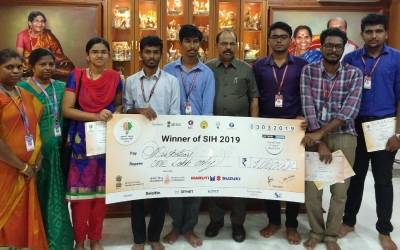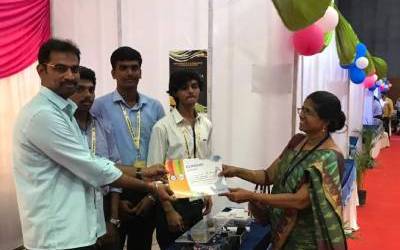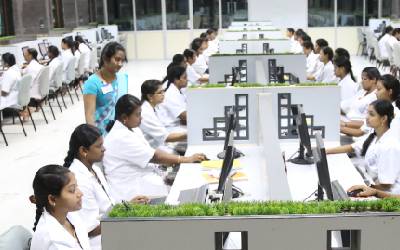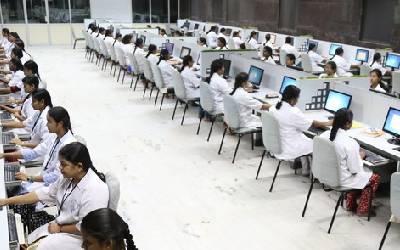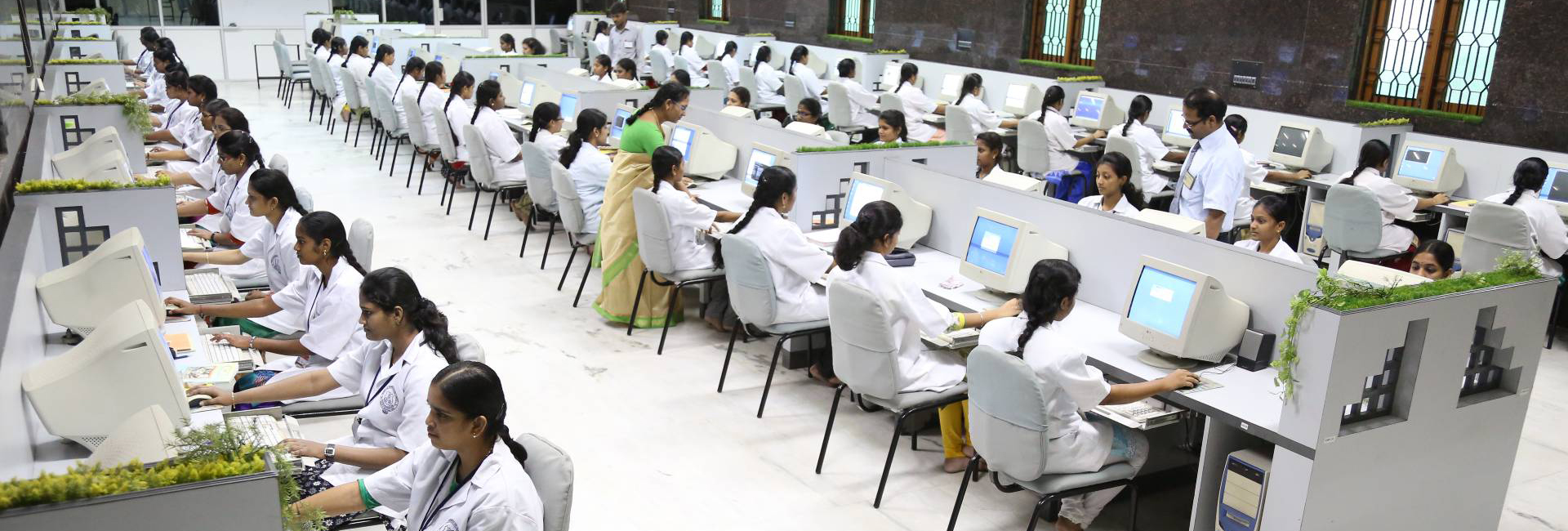
About the Department
Vision and Mission
PEO,PO’S,PSO’S
HOD Profile
Faculty List
Milestones
Professional Society
Clubs
Events
FDP / STTP
ATAL FDP
Newsletter and Magazines
Survey Forms
Question Bank
PG - M.E. CSE
Department Library
Hexaware
CTS CARE
About the Department
The Computer Science and Engineering Department offers the following
programs.
B.E – Computer Science and Engineering ( 4 Years)
M.E. – Computer Science and Engineering ( 2 Years)
Ph.D - Computer Science and Engineering ( Full time / Part time).
The Computer Science and Engineering Department offers both Undergraduate and
Postgraduate programs. It provides an excellent ambiance for students to learn
and acquire the necessary skills required by the IT Industry. Technological
innovation is so rapid in this field that continuous education is essential to
enhance the skill set of students keeping in pace with the current trends. The
department has experienced faculty members who are fully committed to teaching
and research.
The students have access to well equipped, state-of-the-art laboratories. A wide range of activities undertaken in the department allow the students to gain contemporary knowledge of the basic problems in the IT industry. The advance curriculum requires the students to take up a broad spectrum of courses with special emphasis on desired areas of specialization. Hence, the department has brought out exceptional engineers in the past and will continue to do in the years to come. The Department maintains an excellent interaction with IT industry and organizes regular guest lectures by experts, industrial visits, internships etc. and stands for industry – Institute collaboration.



Vision and Mission

VISION
To create a dynamic academic environment that nurtures technologically proficient individuals with a spirit of research, innovation and effective communication while instilling strong social awareness and national responsibility, enabling them to excel in the field of Computer Engineering.
MISSION
- M1: To establish a dynamic academic environment with dedicated faculty and modern resources, fostering expertise in both fundamental concepts and emerging computing domains.
- M2: To equip students with industry-relevant skills, critical thinking abilities, and leadership qualities, while instilling ethical values and a sense of responsibility through knowledge dissemination and technological advancements for societal progress..
- M3: To drive collaborative innovation through partnerships with academia and industry, ensuring seamless exchange of expertise, leading to intellectual property creation, product development, commercialization, and sustained research funding.
Programme Educational Objectives(PEO)
Programme Outcomes (PO)
Programme Specific Outcomes (PSO)
HOD Profile
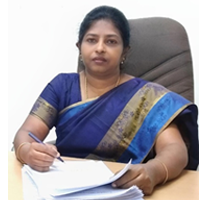
Dr.L.JABASHEELA , M.E .,Ph.D.,
Professor & Head Department of Computer Science and Engineering
Email : csehod@panimalar.ac.in
With over 25 years of dedicated experience in academia and research, Dr. L. Jabasheela has established herself as a distinguished figure in the fields of Image Mining and Data Analytics. She holds a plethora of professional certifications, including Microsoft Certified Professional (MCP) and Microsoft Certified Systems Engineer (MCSE), as well as certification in Robotic Process Automation (RPA) from UiPath, underscoring her extensive expertise and commitment to staying at the forefront of technological advancements.
Academic and Research Contributions
Dr. L. Jabasheela has a prolific record of scholarly contributions, having published numerous papers in esteemed international journals and conferences. Her work has significantly advanced the understanding and application of Image Mining and Data Analytics, garnering respect and recognition from the global academic community. Her guidance has been instrumental in the academic journey of many students, with two research scholars having successfully obtained their PhD degrees under her supervision.
Her intellectual output is not confined to journal articles alone; she has authored over 10 books, each contributing valuable knowledge and insights to the academic and professional communities. Her innovative work has also led to the acquisition of several copyrights and patents, reflecting the practical implications and originality of her research.
Awards and Recognition
Dr. L. Jabasheela outstanding contributions have earned her numerous accolades. She is the recipient of the CSI TechNext Award for Contemporary Book Publication, a testament to the impact and relevance of her literary contributions. Additionally, she has been recognized as the Best Mentor by NPTEL for her exemplary guidance in the Internet of Things (IoT) course, highlighting her dedication to nurturing the next generation of technologists and researchers.
In 2020, her team triumphed in the National Product Development Hackathon conducted by the Computer Society of India (CSI), securing the first prize. This achievement underscores her leadership and innovative thinking in tackling complex problems and developing practical solutions.
Professional Affiliations
A respected member of several professional societies, Dr. L. Jabasheela is affiliated with the Institute of Electrical and Electronics Engineers (IEEE), Computer Society of India (CSI), International Association of Computer Science and Information Technology (IACSIT), and the International Engineers Association (IEANG). These memberships reflect her active engagement with the broader professional community and her commitment to continuous professional development.
Funded Projects and Grants
Dr. L. Jabasheela has successfully secured substantial funding to support her research endeavors. She has received grants totaling Rs. 26.15 lakhs from prestigious organizations including the All India Council for Technical Education (AICTE), Hyundai WIA India Ltd, Tamil Nadu State Council for Science and Technology (TNSCST), and Anna University. These funds have been pivotal in advancing her research projects, enabling significant contributions to the fields of Image Mining and Data Analytics.
Faculty List
| S.No. | Name of the Faculty | Designation |
|
1. |
Dr. JABASHEELA L |
PROFESSOR & HEAD |
|
2. |
Dr. KAVITHA SUBRAMANI |
PROFESSOR |
|
3. |
Dr. SUBEDHA V |
PROFESSOR |
|
4. |
Dr. VALARMATHI K |
PROFESSOR |
|
5. |
Dr. RAJENDIRAN M |
PROFESSOR |
|
6. |
Dr. VINMATHI M S |
PROFESSOR |
|
7. |
Dr. JOSPHINE LEELA R |
PROFESSOR |
|
8. |
Dr. HARIHARAN S |
PROFESSOR |
|
9. |
Dr. HEMLATHADHEVI A |
PROFESSOR |
|
10. |
Dr. SENTHIL KUMAR G |
PROFESSOR |
|
11. |
Dr. BALAJI S |
PROFESSOR |
|
12. |
Dr. SATHISH KUMAR P J |
PROFESSOR |
|
13. |
Dr. TAMILVIZHI T |
PROFESSOR |
|
14. |
Dr. HEMALATHA S |
PROFESSOR |
|
15. |
Dr. ANBARASA PANDIYAN A |
PROFESSOR |
|
16. |
Dr. UMARANI SRIKANTH G |
PROFESSOR |
|
17. |
Dr. SEETHA J |
PROFESSOR |
|
18. |
Dr. VIGNESH T |
PROFESSOR |
|
19. |
Dr. SATHIYA V |
PROFESSOR |
|
20. |
Dr. SHANMUGANATHAN M |
PROFESSOR |
|
21. |
Dr. SANGEETHA K |
PROFESSOR |
|
22. |
Dr. JACKULIN T |
PROFESSOR |
|
23. |
Dr. LAKSHMI D |
PROFESSOR |
|
24. |
Dr. SANGEETHA M |
PROFESSOR |
|
25. |
Mrs. ANITHA MOSES V |
PROFESSOR |
|
26. |
Dr. DEEPA P |
ASSOCIATE PROFESSOR |
|
27. |
Dr. KRISHNAMOORTHY M |
ASSOCIATE PROFESSOR |
|
28. |
Dr. SANTHANA LAKSHMI S T |
ASSOCIATE PROFESSOR |
|
29. |
Dr. THERASA M |
ASSOCIATE PROFESSOR |
|
30. |
Dr. MAHESWARI M |
ASSOCIATE PROFESSOR |
|
31. |
Dr. VIJAYALAKSHMI P |
ASSOCIATE PROFESSOR |
|
32. |
Dr. KAVITHA S |
ASSOCIATE PROFESSOR |
|
33. |
Dr. MURUGANANDAM S |
ASSOCIATE PROFESSOR |
|
34. |
Dr. JACKULIN C |
ASSOCIATE PROFESSOR |
|
35. |
Dr. THYAGARAJAN C |
ASSOCIATE PROFESSOR |
|
36. |
Dr. SALINI R |
ASSOCIATE PROFESSOR |
|
37. |
Dr. GUNASEKARAN K |
ASSOCIATE PROFESSOR |
|
38. |
Dr. SUDHA MERCY S |
ASSOCIATE PROFESSOR |
|
39. |
Dr. UMAMAHESWARI A |
ASSOCIATE PROFESSOR |
|
40. |
Mr. KAJENDIRAN K |
ASSOCIATE PROFESSOR |
|
41. |
Mr. SASIKUMAR A N |
ASSOCIATE PROFESSOR |
|
42. |
Dr. RAVEENA S |
ASSISTANT PROFESSOR |
|
43. |
Dr. KANCHANA A |
ASSISTANT PROFESSOR |
|
44. |
Dr. VIDHYA M |
ASSISTANT PROFESSOR |
|
45. |
Ms. YAMUNA DEVI S |
ASSISTANT PROFESSOR |
|
46. |
Mr. KARTHIKEYAN A |
ASSISTANT PROFESSOR |
|
47. |
Mrs DHIVYA M |
ASSISTANT PROFESSOR |
|
48. |
Mrs. ABIRAMI M |
ASSISTANT PROFESSOR |
|
49. |
Mr. RAJA S |
ASSISTANT PROFESSOR |
|
50. |
Mrs. ARCHANA E |
ASSISTANT PROFESSOR |
|
51. |
Mrs. DIVYA S |
ASSISTANT PROFESSOR |
|
52. |
Mrs. JENNIFER D |
ASSISTANT PROFESSOR |
|
53. |
Mrs LINCY JEMINA S |
ASSISTANT PROFESSOR |
|
54. |
Mr. TAMILARASAN T |
ASSISTANT PROFESSOR |
|
55. |
Mr. THAMIM AZARUDEEN K |
ASSISTANT PROFESSOR |
|
56. |
Mrs. SUTHADEVI T |
ASSISTANT PROFESSOR |
|
57. |
Ms. NARMADHA P G |
ASSISTANT PROFESSOR |
|
58. |
Mrs. NEELA GANDHI V |
ASSISTANT PROFESSOR |
|
59. |
Mrs. RAJESHWARI R |
ASSISTANT PROFESSOR |
|
60. |
Mr. WILLIAM ANDREWS J |
ASSISTANT PROFESSOR |
|
61. |
Mr. RAMANA R |
ASSISTANT PROFESSOR |
|
62. |
Mr. ALWIN INFANT P |
ASSISTANT PROFESSOR |
|
63. |
Mrs. AMUDHA K |
ASSISTANT PROFESSOR |
|
64. |
Mrs. CINTHUJA K |
ASSISTANT PROFESSOR |
|
65. |
Mr. IRUDYA PAUL RAJ VINOD A |
ASSISTANT PROFESSOR |
|
66. |
Mrs. JAICHITRA VASUDEVAN I |
ASSISTANT PROFESSOR |
|
67. |
Mrs. JAYA LAKSHMI R |
ASSISTANT PROFESSOR |
|
68. |
Ms. PADMA PRIYA J |
ASSISTANT PROFESSOR |
|
69. |
Mrs. PREENA JACINTH SHALOM S |
ASSISTANT PROFESSOR |
|
70. |
Mr. RAMA KRISHNAN S |
ASSISTANT PROFESSOR |
|
71. |
Mrs. SATHYA J |
ASSISTANT PROFESSOR |
|
72. |
Ms. SHERINE W B |
ASSISTANT PROFESSOR |
|
73. |
Mrs. SIVAKAMY N |
ASSISTANT PROFESSOR |
|
74. |
Ms. SOORYA S |
ASSISTANT PROFESSOR |
|
75. |
Mrs. SOPHANA JENNIFER S |
ASSISTANT PROFESSOR |
|
76. |
Ms. SUNTHEYA A K |
ASSISTANT PROFESSOR |
|
77. |
Mr. SURESH S |
ASSISTANT PROFESSOR |
|
78. |
Ms. YOGASHREE G S |
ASSISTANT PROFESSOR |
|
79. |
Ms RAMYA PRABA |
ASSISTANT PROFESSOR |
|
80. |
Mrs ASWINI V |
ASSISTANT PROFESSOR |
|
81. |
Mrs. SATHIYA L |
ASSISTANT PROFESSOR |
|
82. |
Mrs. RAMYA R |
ASSISTANT PROFESSOR |
|
83. |
Mrs. MAHALAKSHMI P |
ASSISTANT PROFESSOR |
|
84. |
Mrs. PRABHA A |
ASSISTANT PROFESSOR |
|
85. |
Mrs. GUNAVATHY K S |
ASSISTANT PROFESSOR |
|
86. |
Mrs. RAJALAKSHMI E |
ASSISTANT PROFESSOR |
|
87. |
Mrs REENA D |
ASSISTANT PROFESSOR |
|
88. |
Mrs. SHOBANA M |
ASSISTANT PROFESSOR |
|
89. |
Mrs. MOHANA PRIYA P |
ASSISTANT PROFESSOR |
|
90. |
Mrs. JEBASUDHA D |
ASSISTANT PROFESSOR |
|
91. |
Mrs. VISHNU PRIYA S |
ASSISTANT PROFESSOR |
|
92. |
Mrs. SHARMILA S |
ASSISTANT PROFESSOR |
|
93. |
Ms. NITHIYA SREE P |
ASSISTANT PROFESSOR |
|
94. |
Ms. ROHINI S |
ASSISTANT PROFESSOR |
|
95. |
Ms. SUDHA V |
ASSISTANT PROFESSOR |
|
96. |
Mr. PRABBU SHANKAR P |
ASSISTANT PROFESSOR |
|
97. |
Mrs. DEEPA A |
ASSISTANT PROFESSOR |
|
98. |
Mrs PREETHIKA P |
ASSISTANT PROFESSOR |
|
99. |
Ms. SANGEETHA R |
ASSISTANT PROFESSOR |
|
100. |
Mrs. SARANYA DEVI A |
ASSISTANT PROFESSOR |
|
101. |
Ms. AKSHAYA M |
ASSISTANT PROFESSOR |
|
102. |
Mrs. ALIMA BEEVI A |
ASSISTANT PROFESSOR |
|
103. |
Mr. AZHAGURAJ A |
ASSISTANT PROFESSOR |
|
104. |
Mr. ELANGOVAN C |
ASSISTANT PROFESSOR |
|
105. |
Mrs. GOMATHI N |
ASSISTANT PROFESSOR |
|
106. |
Mr. KADIRVELU G |
ASSISTANT PROFESSOR |
|
107. |
Mr. KARTHIKEYAN V |
ASSISTANT PROFESSOR |
|
108. |
Mrs. MARY BENITA A |
ASSISTANT PROFESSOR |
|
109. |
Mrs. MONIKA S |
ASSISTANT PROFESSOR |
|
110. |
Mrs. NAGESWARI V |
ASSISTANT PROFESSOR |
|
111. |
Mrs. SAHITYA PRIYADHARSHINI K |
ASSISTANT PROFESSOR |
|
112. |
Mr. VADIVELU A |
ASSISTANT PROFESSOR |
|
113. |
Mr. VEERAMANIKANDAN K |
ASSISTANT PROFESSOR |
|
114. |
Mr. DHAKSHUNHAAMOORTHY |
ASSISTANT PROFESSOR |
|
115. |
Mr. AYYAPPAN K |
ASSISTANT PROFESSOR |
|
116. |
Ms PREETHI V |
ASSISTANT PROFESSOR |
|
117. |
Ms. RUBINA A M |
ASSISTANT PROFESSOR |
|
118. |
Mrs. SUJA RAJESWARI K |
ASSISTANT PROFESSOR |
|
119. |
Mrs. SWETHA M |
ASSISTANT PROFESSOR |
|
120. |
Ms. VICHILI M YAMINI |
ASSISTANT PROFESSOR |
|
121. |
Mr. ANBURAJ A |
ASSISTANT PROFESSOR |
|
122. |
Mr. RAVINDRAN U |
ASSISTANT PROFESSOR |
|
123. |
Mrs. GEETHANJALI A |
ASSISTANT PROFESSOR |
|
124. |
Mrs. PONRATHI P |
ASSISTANT PROFESSOR |
|
125. |
Ms. AVUDAI SELVI S |
ASSISTANT PROFESSOR |
|
126. |
Ms. VIDHYA L |
ASSISTANT PROFESSOR |
|
127. |
Ms. BHALASHRI SETHURAMAN |
ASSISTANT PROFESSOR |
First Year Faculty List
| S.No. | Name of the Faculty | Designation |
|
1. |
Mr. DEAN BEEMA RAO B |
ASSISTANT PROFESSOR |
|
2. |
Ms. SARANYA G |
ASSISTANT PROFESSOR |
|
3. |
Ms. SUMITHRA S |
ASSISTANT PROFESSOR |
|
4. |
Ms. JEYARATHNA M |
ASSISTANT PROFESSOR |
|
5. |
Mrs. NIRMALA DEVI K |
ASSISTANT PROFESSOR |
|
6. |
Mrs. SUGANYA S |
ASSISTANT PROFESSOR |
|
7. |
Ms. DIVYA T |
ASSISTANT PROFESSOR |
|
8. |
Mr. SURIYA PRAKASH P |
ASSISTANT PROFESSOR |
|
9. |
Mrs. RASHIKA RS |
ASSISTANT PROFESSOR |
|
10. |
Ms. KANMANI S |
ASSISTANT PROFESSOR |
|
11. |
Ms. DIVYA A |
ASSISTANT PROFESSOR |
|
12. |
Mr. MAGUDAPATHY B |
ASSISTANT PROFESSOR |
|
13. |
Mrs DIVYA DARSHINI M S |
ASSISTANT PROFESSOR |
|
14. |
Mrs UMA SHANKAR J S |
ASSISTANT PROFESSOR |
|
15. |
Mr. YUVARAJ P |
ASSISTANT PROFESSOR |
|
16. |
Mr. VENKADESH V |
ASSISTANT PROFESSOR |
|
17. |
Mrs. VIDHYA V |
ASSISTANT PROFESSOR |
|
18. |
Mr. LOKESH A |
ASSISTANT PROFESSOR |

